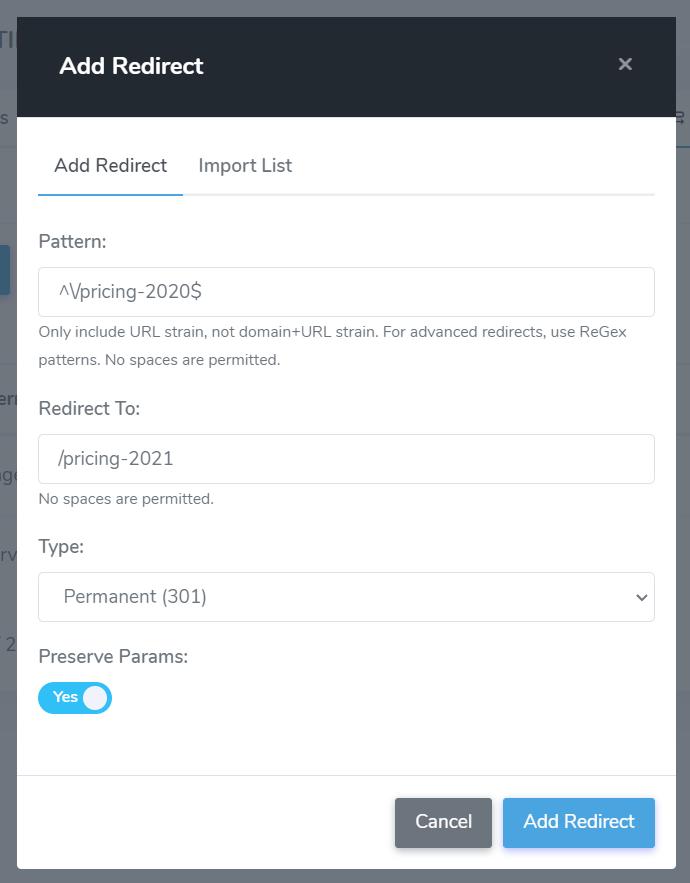Redirects allow you to divert traffic from one page to another. Redirects are especially helpful when you want to direct traffic from an old page to a new one.
In This Article:
- Accessing Redirects
- Redirecting a single page
- Wildcard Redirect
- Remove /pages/ in the URL structure
- Remove /services in the URL structure
- Remove /home in the URL structure
- Redirect a deleted page:
- Edit an existing Redirect
- Deleting Redirects
- Importing Multiple Redirects
- Tips
Accessing Redirects
- Log in as an admin (How to Login).
- Hover over your profile within the liveedit toolbar then select Account Settings.

- Click on the Redirects tab.

Redirecting a single page
You can redirect any single page to a new internal page of your LiveEdit website or to an external page. For this example, let’s redirect on old pricing page (/pricing-2020) to a new one (/pricing-2021):
Navigate to the Redirects Tab
Click the Add Redirect button
In the Pattern field, add in ^\/ + Page URL+ $. For example: ^\/pricing-2020$
Note that the “\/” is a backslash and forward slashIn the Redirect To field, add in the new page. For example: /pricing-2021
In the Type selector, select Permanent
Click Add Redirect

Wildcard Redirect
A wildcard redirect allows you to redirect multiple page variances at once. For example, let’s say you want to redirect your pricing page (/pricing) and anything that comes after it (/pricing1, /pricing2, /pricing3) to a new pricing page.
Navigate to the Redirects Tab
Click the Add Redirect button
In the Pattern field, add in ^\/? + Page URL. For example: ^\/?pricing
Note that the “\/” is a backslash and forward slashIn the Redirect To field, add in the new page. For example: /pricing-new
In the Type selector, select Permanent
Click Add Redirect

Remove /pages/ in the URL structure
By default, all internal pages include "/pages/" in the URL structure. To remove this and simplify the URL, add the following redirect:
Navigate to the Redirects Tab
Click the Add Redirect button
In the Pattern field, add in ^\/pages\/([^\/]*)$
Note that the “\/” is a backslash and forward slashIn the Redirect To field, add in /$1
In the Type selector, select Permanent
Click Add Redirect

Remove /services in the URL structure
By default, all internal service pages, such as the Blog and Recipe, include "/services/" in the URL structure. To remove this and simplify the URL, add the following redirect:
Navigate to the Redirects Tab
- Click the Add Redirect button
- In the Pattern field, add in ^\/service\/([^\/]*)$
Note that the “\/” is a backslash and forward slash - In the Redirect To field, add in /$1
- In the Type selector, select Permanent
- Click Add Redirect

Remove /home in the URL structure
If your Homepage has the URL of "/home", you can simplify it with the following redirect:
Navigate to the Redirects Tab
- Click the Add Redirect button
- In the Pattern field, add in ^\/home$
Note that the “\/” is a backslash and forward slash - In the Redirect To field, add in /
- In the Type selector, select Permanent
- Click Add Redirect

Redirect a deleted page:
If you recently deleted a page and want to ensure links don't go to a "404 page not found" error, we recommend redirecting the URL to your homepage or other relevant page. For example, let's redirect an old holiday event page (/holiday-event) to the homepage:
Navigate to the Redirects Tab
- Click the Add Redirect button
- In the Pattern field, add in ^\/? + Page URL+ $. For example: ^\/holiday-event$
Note that the “\/” is a backslash and forward slash - In the Redirect To field, add in /
- In the Type selector, select Permanent
- Click Add Redirect

Edit an existing Redirect
To edit an existing redirect, click on the Pencil icon under the Actions column for the redirect.
Deleting Redirects
To delete a single redirect, click on the Trash Can icon under the Actions column for the redirect

To delete multiple redirects at once, select each one then click Delete Selected Redirects.

Importing Multiple Redirects
If you have multiple redirects you need to add, you can import them as a CSV file. Please Click Here to see an example CVS file with the correct formatting. Once your CVS file is created, please follow these steps to import it:
- Click Add Redirects
- Click on the Import List tab
- Upload your CSV file

Tips
- If you get a "Please provide a valid pattern." error message when attempting to save, make sure your redirect has no spaces.
- If you have multiple redirects and looking for a specific one, try using the Search field in the top right!

- If you delete a page, make sure to redirect the URL to a new page to ensure customers do not land on a "404 page not found" error.
- Choose 301 (permanent) if you don’t plan on removing the redirect.
- Choose 302 (temporary) if the redirect will be removed eventually.
